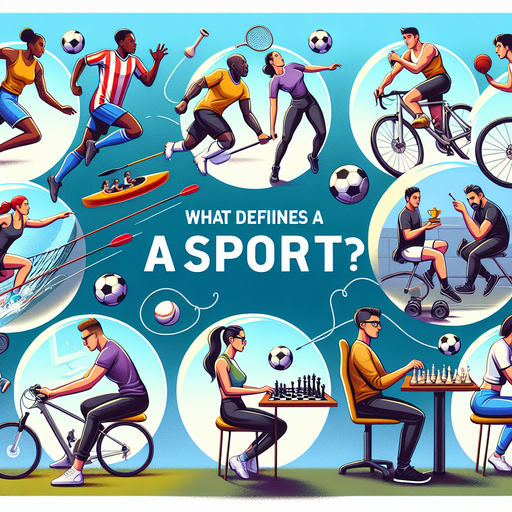What Defines A Sport

In recent years, the definition of what constitutes a sport has become increasingly fluid and debated. From traditional games to modern eSports, the boundaries of what we classify as a sport are continuously evolving. This blog post delves into the fundamental elements that define a sport, exploring its core components, cultural significance, and emerging trends.
Understanding the Core Elements of a Sport
At its most basic level, a sport is typically characterized by physical exertion, skill, competition, rules, and an element of entertainment. These components form the foundation upon which traditional sports are built:
- Physical Exertion: Most sports require some level of physical activity, whether it's running, jumping, or striking. This physical challenge is a key aspect that differentiates sports from other types of games or competitions.
- Skill: Sports demand a certain level of skill or expertise. Athletes train for years to hone their abilities, whether it's precision, speed, agility, or strategy.
- Competition: The essence of sports lies in competition, where individuals or teams vie against one another to achieve a goal or win a match.
- Rules: Every sport is governed by a set of rules that ensure fair play and standardize the competition, allowing for a clear determination of winners and losers.
- Entertainment: Sports captivate audiences worldwide, offering entertainment and a sense of community and shared experience among fans.
The Cultural Significance of Sports
Sports often transcend their athletic and competitive components, becoming integral parts of cultural identity and societal values. They can unite communities, promote healthy lifestyles, and even influence political and social change. Major sporting events like the Olympics or the World Cup showcase this cultural significance, bringing together diverse populations in a celebration of athletic achievement and camaraderie.
Emerging Trends: The Case of eSports
In the digital age, the emergence of eSports has challenged traditional notions of what constitutes a sport. While lacking physical exertion, eSports involve high levels of skill, competition, and organization, mirroring many aspects of conventional sports. Professional gamers train intensively and compete in structured tournaments with significant viewership, raising the question: Should eSports be considered a sport?
The debate continues, but the growing legitimacy and popularity of eSports suggest that the definition of sports is expanding to include digital competitions.
Conclusion: A Fluid and Evolving Definition
The definition of a sport is far from static. As society evolves, so too does our understanding of sports and their role in culture. While traditional components like physical exertion and competition remain central, the rise of digital and unconventional sports challenges us to rethink these boundaries. Ultimately, a sport is as much about the shared human experience it fosters as it is about its technical components.
As we continue to embrace new forms of competition, the definition of a sport will likely broaden, reflecting the dynamic nature of human creativity and interaction.